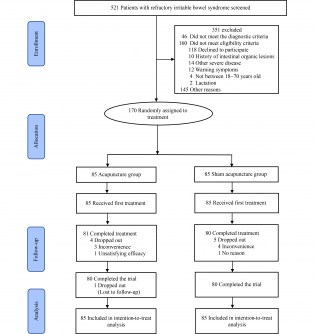Research conducted by the **Beijing University of Chinese Medicine** and **Chengdu University of Traditional Chinese Medicine** has revealed positive results regarding the use of acupuncture in treating patients with refractory irritable bowel syndrome (IBS). The study, titled “Efficacy of Acupuncture in Refractory Irritable Bowel Syndrome Patients: A Randomized Controlled Trial,” was published in **Frontiers of Medicine**, Volume 18, Issue 4.
Irritable bowel syndrome is a prevalent functional gastrointestinal disorder that can significantly diminish a patient’s quality of life. Current pharmacological treatments and psychological therapies often yield limited success, especially in cases deemed refractory. This study aimed to evaluate both the efficacy and safety of acupuncture compared to sham acupuncture in individuals suffering from this challenging condition.
The researchers conducted a multicenter trial involving **170 patients**, with **85 individuals** in each treatment group. Participants received either authentic acupuncture or sham acupuncture three times a week for a total of **12 sessions**, while continuing their usual treatment methods. The primary measure of success was the change in the IBS-Symptom Severity Scale (IBS-SSS) score from baseline to week 4.
Study Findings and Patient Outcomes
Data analysis revealed that the total IBS-SSS score decreased by **140.0** (95% CI: 126.0 to 153.9) in the acupuncture group, while the sham group showed a reduction of **64.4** (95% CI: 50.4 to 78.3). This resulted in a significant between-group difference of **75.6**, indicating a substantial advantage for patients receiving real acupuncture.
The positive effects of acupuncture persisted throughout a **4-week follow-up** period. Notably, patients who underwent acupuncture reported improvements in their overall quality of life and better adaptability in social and work environments. Importantly, no serious adverse events were recorded, suggesting that acupuncture is a safe treatment option when combined with standard care.
The findings from this study contribute vital evidence supporting the use of acupuncture as a viable alternative for managing refractory IBS. By offering additional treatment options, this research may enhance clinical practices and patient outcomes in gastrointestinal health.
For those interested in further details, the complete research paper is accessible at https://doi.org/10.1007/s11684-024-1073-7.







